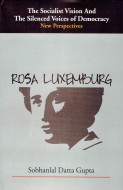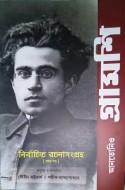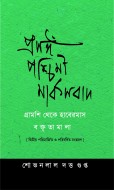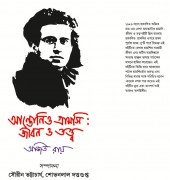Search results for 'Gramsci'
-

The Socialist Vision And The Silenced Voices of Democracy- New Perspectives - : ROSA LUXEMBURG
Author: Sobhanlal Datta Gupta
₹495.00Rosa Luxemburg whom Franz Mehring called “the best brain after Marx in socialist movement” after the death of Marx remained protractedly maligned for over half a century by Josef Stalin and his sidekicks in the Russian Social Democratic Labour Party — subsequently rechristened as the Communist Party of Soviet Union (Bolshevik) and thereafter CPSU — was the ‘ideologue’ of “Luxemburgism” and counter-revolutionary strain of Menshevism. Dr William A Pelz blasted “Luxemburgism “ as “clumsy, cynical and self- serving parody on the ideas of Rosa Luxemburg” at the International Rosa Luxemburg Conference — Internationale Rosa-Luxemburg-Gesellschaft (IRLS) — in Tokyo (April 2007). It was the sixth such conference. The first such meet took place in Chicago in 1998. Last year, Seoul was the venue of the IRLC which is organised by the International Rosa Luxemburg Society (IRLS) that aims at demolition of tendentious ‘Luxemburgism’ and restoration of theoretical and practical struggle, initiated by Luxemburg. The rediscovery of Luxemburg — Another Luxemburgism is possible: Reflections on Rosa and the Radical Socialist Project, the title of Dr Pelz’s paper — could be congenial after the fall of ‘Official Marxism’ (sadly with the fall of Soviet Union). Dr Sobhanlal Datta Gupta, formerly Surendranath Banerjee Chair of political science, University of Calcutta, who has attended every IRLS since 1998 and an internationally reputed research scholar on the international communist movement, has done yet another commendable work, The Socialist Vision and The Silenced Voices of Democracy — New Perspectives — Part I, Rosa Luxemburg (Seriban, Bakhrahat, South 24 Parganas district, West Bengal, Rs495), a 137-page book, packed with reference to source materials which will help scholars engaged in research on Luxemburg. Gupta is at work for the next two books under this series: one on Nikolai Bukharin and another on György Lukács. “Freedom” Luxemburg wrote famously in the Marxian spirit, “is always the freedom of those who think differently”. Unlike Bolsheviks, including Lenin, she had stuck unflinchingly to the ‘Hegelian-Marxian’ trait in contrast to ‘ultra-centralism’ of RSDLP, the ruling party (after the Bolshevik Revolution) under Lenin. She did her best to rid ‘Marxism’ or Marxian temper of what Robert Locker described as ‘organisational fetishism’, leading to ossification of the RSDLP due to ‘purely mechanistic fashion’ of running the party and the governmental power during Lenin’s lifetime. Luxemburg was compelled to criticise Lenin’s (Trotsky’s too) ‘organisational centralism’. She differed profoundly with Lenin’s aberrant experiment of vanguard role of the party that Marx never prescribed. Gupta’s advantage was his almost six month research at the archive of the Communist International (Third International or Comintern) in Moscow after it was declassified during the last years of Gorbachev era. He published a seminal work, Comintern and the Destiny of Communism in India — Dialectics of Real and Possible History, which was translated into German and Malayalam. The present treatise is split into six sequentially built chapters: New Historiography, Vision of Socialism and Democracy and Spontaneity contra Centralism of Luxemburg, Internationalism of Communism and Destiny of Rosa Luxemburg and Rosa Luxemburg and the World Today. His identification of Rosa as ‘ a heretic, a revolutionary with a difference and so remained a constant threat to all those who felt it safe not to question the claims of official Marxism’ guides a reader to understand the meaning of Dr Pelz’s paper ‘Another Luxemburgism is possible’. Her real name was Rozalia Luksenburg, born in 1871, into a Polish family of secular Jews in a small city in Russian-occupied Poland. How brutally she was killed on January 15, 1919, as a sequel to the abortive bid of her party Independent Socialist Party of Germany (USPD) to overthrow the Ebert-Scheidemann government is well known. Stalin embarked on abusive vilification of her theoretical contributions 12 years thereafter through his infamous letter ‘On Some Questions Concerning the History of Bolshevism’, published in Proletarskaia Revoliutsiia (1931). He blamed Rosa for ‘counterrevolutionary Menshevism’, a tendentious accusation. Instantaneously, Leon Trotsky, Stalin’s enemy number one, lashed out at him with a sharp polemical essay, Hands off Rosa Luxemburg. The wilful abuse against Luxemburg remained unchanged even after the Stalin period. Which was why Annelies Laschitza, the outstanding biographer of Luxemburg, had to submit the manuscript within the bureaucratic frame, set out by the central committee of erstwhile Socialist Unity Party of now-defunct German Democratic Republic, although she and Gunter Radczuan jointly headed the project for Rosa’s biography. “From her own testimony it is now evident that there were vast gaps, distortions, if not falsifications, in the name of Leninism”, noted Gupta. Laschitza’s keynote address, Encountering Rosa Luxemburg-Past and Present, at a symposium, organised by the Berlin-based Institute of History of Working Class in March 1989 is ‘a fascinating analysis’, he adds. Laschitza criticised Lenin for loose comments on the great revolutionary in his Notes of a Publicist’( November 1922), ‘without actually reading it’. Gupta’s paper Understanding Socialism as Hegemony: Rosa Luxemburg and Nikolai Bukharin at the Tokyo conference of IRLS (2007) is an original contribution. Bukharin was closer to Luxemburg than Antonio Gramsci and György Lukács, Gupta observed. Bukharin wrote poignantly: “A static and tranquillised attitude is a trait that grows out of parasitism… The active and creative quality of socialist culture results in an ever-renewed growth of both material and spiritual needs, in which the latter develop into actual passions”. Bukharin thought of ‘new man’ in socialist or communist society like Rosa. Official Marxism never thought alike. However, the new revelations about Luxemberg are mostly in German. Out of her 900-plus letters, edited by Laschitza, Georg Adler and, Peter Hudis, less than 250 have been translated into English. We hope IRLS will look into the matter. Learn More -

Antonio Gramsci-Selected Writings (Volume I) in Bengali
Author: Translated and Edited by Sourin Bhattacharya and Samik Bandyopadhyay
₹400.00Antonio Gramsci-Selected Writings (Volume I) in Bengali-Translated and Edited by Sourin Bhattacharya and Samik Bandyopadhyay. Learn More -

Prasanga Paschimi Marxbad: Boktritamala Gramsci theke Habermas- Second Enlarged Edition
Author: Sobhanlal Datta Gupta
₹250.00বইটির প্রথম সংস্করণে (২০২০) ছয়টি বক্তৃতার মাধ্যমে পশ্চিমী মার্কসবাদের স্বরূপ, গ্রামশি, লুকাচ, কর্শ, ফ্রাংকফুর্ট স্কুল এবং হাবেরমাসের তত্ত্বগুলি নির্বাচিত গ্রন্থতালিকা সহ পরিবেশিত হয়েছিল । দ্বিতীয় সংস্করণে (২০২২) পশ্চিমী মার্কসবাদের স্বরূপ, গ্রামশি এবং ফ্রাংকফুর্ট স্কুল বিষয়ক বক্তৃতাগুলির আমূল পরিমার্জন ও পরিবর্ধন করা হয়েছে I প্রয়োজনীয় পরিমার্জন করা হয়েছে অন্য বক্তৃতাগুলির ক্ষেত্রেও I নির্বাচিত গ্রন্থতালিকাতে বেশ কিছু নতুন বই-এর অন্তর্ভুক্তি ঘটেছে । Learn More -

Gramscir Jibon O Tatta- by Ajit Roy
Author: Ajit Roy
₹250.00A bengali book written by Late Ajit Roy on Gramsci's life and his theory. It was first published in 1989. Now it has been published with two new introduction by Prof. Sobhanlal Duttagupta and Prof. Sourin Bhattacharya. Learn More

